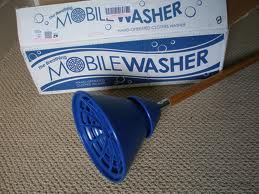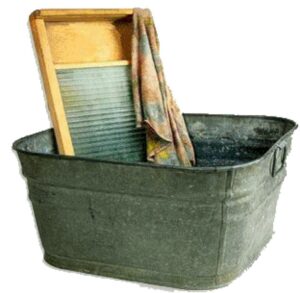[/caption]
My mother was in her early twenties during WW2 and lived in England. Talking with her about her experiences during rationing and other shortages has been helpful to me. One of the things that she has mentioned to me was shortages of laundry soap and other soaps. She said that this became quite a health problem. The health of babies and small children were threatened due to the lack of soap. Lack of simple things like hand washing can be major reason for the spread of diseases.
Cleanliness is something we take for granted, we shower every day and put on clean clothes. Soap is cheap and plentiful. I am going to strongly suggest that you experiment with washing your clothes with a washboard or plunger. The plunger named “The Breathing Mobile Washer” is the best, I have seen. It is easier than a washboard or doing the laundry by hand. Do you have a outdoor clothes line?

Now is the time to stock up on soaps while they are still available and inexpensive. I know that lye soap can be made at home, but if you are facing a long-term disaster, having a good supply of soap on hand will let you put this chore off until later.
Modern soaps are also less damaging to your hands and clothing.
Howard



Good advice. My friend in Italy told me that post WW2 into the 1950s that soap was worth more than tobacco or spirits. When soap was not available and potable water was scarce the common expedient was to wash and sanitize dishes, utensils and clothing by boiling in sea water first treated with vinegar,then another rinse in hot sea water treated with baking soda, if they had any, otherwise plain boiled sea water.
A sand scoured oil drum or wine barrel served asthe washing machine, stirring with wooden paddles. In poor areas of Tuscany Gypsies still wash that way.
You will be able to make soap from rendered fat and hardwood ashes. Even in hard times, these two items will be available. People will still be eating meat; hence the fat, and burning wood for heat/cooking; hence the ashes. What I’ve seen in many, many posts and recipes are a few other necessaries around the homestead: baking soda, vinegar and ammonia. All 3 of these items are very cheap now, easy to store, I’d suggest you store these as well as your store bought soap, until making your own shampoo/toothpaste/soap/pickles, etc becomes essential.
I’ve been saying for a long time that proper hygiene will be among the biggest problem we will face in any long term emergency. Thank you for reminding us that something as simple as soap can be so important!
I am fortunate enough to have some knowledgable folks with me who know how to make soap. I’ve stockpiled some but this is always something to be studied too as to what the American Indians did as well as Inuits etc.